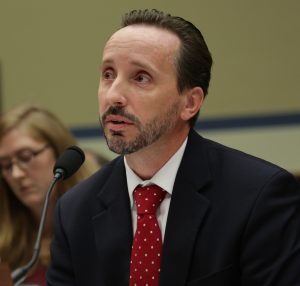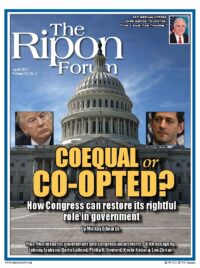 Mark Twain famously remarked, “Suppose you were an idiot, and suppose you were a member of Congress; but I repeat myself.”
Mark Twain famously remarked, “Suppose you were an idiot, and suppose you were a member of Congress; but I repeat myself.”
Although famously crotchety, he did touch upon a basic truth: our elected officials are amateurs. They arrive in Washington, DC with only an inkling of how government works. How could it be otherwise?
Few legislators have any previous federal policy experience. Many have made their careers in business or law. Others worked as doctors, teachers, farmers, law-enforcement officers, and ministers. Members of Congress are we the people, not an aristocratic caste of policy elites trained since birth to govern.
And there is the flip side of the coin: our federal government is immense. There are approximately 180 agencies through which flow $4 trillion per year of our tax dollars for innumerable programs and objectives (the U.S. Code volume of laws relating to agriculture policy alone runs 2,000 pages). Nearly 180,000 pages of regulations exist which inject government authority into nearly every facet of life. The government employs almost four million individuals, along with an untold number of contractors. (Some 710,000 work for the Department of Defense alone.) Tens of thousands of not-for-profits get federal grants to do things for the government, like combating opioid addiction.
Our federal government is immense. There are approximately 180 agencies through which flow $4 trillion per year of our tax dollars for innumerable programs and objectives.
Is it any wonder, then, that Congress often seems clueless and incapable of decision?
Our national legislature has made governing even more difficult by reducing its staff. The number of people who work for the congressional committees, the founts of public policy and government oversight, has gone down more than 25 percent the past four decades. The corps of civil servant experts at the Congressional Research Service and the Government Accountability Office (GAO) also has declined. And the percentage of congressional staff who work in DC on policy has declined, as legislators have tasked more of their charges to work on constituents’ issues (like gripes about the IRS).
Republicans, it must be admitted, are largely responsible for this sorry state of affairs. The public feels that Congress is overstaffed, and GOP legislators long ago picked up on that vibe and turned their down-sizing government fire on themselves. This war on congressional capacity began during the Gingrich revolution. Republicans cut GAO’s cohort of auditors and program analysts by a quarter. The Office of Technology Assessment, which helped Congress comprehend emerging technologies, was zeroed out in 1995, just as the Internet revolution and attendant economic disruption arrived.
This “penny-wise, pound-foolish” mindset lives on today, exemplified by the legislators who try to prove their small government cred by annually returning a portion of the staffing money they receive to the U.S. Treasury.
The GOP desperately needs to revise its mindset on congressional capacity. Shrinking the legislative branch and bad-mouthing it has not worked — the public’s dudgeon for Congress has been at historic lows for years.
To start, the Republicans should remind the public that Congress, for all its faults, is the most democratic of the three branches. It comprises 535 individuals chosen by voters to represent their interests. Congress — not the president or the judiciary — is the branch most connected to the concerns of the average Joe and Jane. As such, the “First Branch” is the heart of our system of self-governance. (Admirably, some Tea Party legislators, like Sen. Mike Lee (R,UT), already are doing this.)
The GOP desperately needs to revise its mindset on congressional capacity. Shrinking the legislative branch and bad-mouthing it has not worked.
Second, legislators should tell voters that governance is a zero-sum game. The weaker Congress is, the more powerful the executive — and judiciary, for that matter — must be. Not long ago, President Barack Obama exclaimed that he had a telephone and a pen, and that he was happy to use them to unilaterally make policy regardless of the wishes of Congress or the American people.
Third, legislators must quit peddling the appealing notion of the earnest, amateur legislator who can appear at the Capitol three days a week and govern with pure horse-sense. The leviathan is too huge, complex, and relentless for that. It takes an immense amount of knowledge to rule wisely. And Congress cannot oversee the immense federal government and weed out waste, fraud, and abuse without more manpower.
Finally, the GOP should tap into the public’s dislike of lobbyists and insider-influence by pointing out that a weak Congress is an easily corrupted Congress. Today, more money is spent annually on lobbyists than Congress spends on its own operations. K Street’s policy shops are stocked with former members of Congress and Hill staff with deep policy experience. The fewer policy experts Congress has on staff, the more lawmakers must rely upon lobbyists to advise them on legislation.
There are signs of congressional revival on Capitol Hill. Last year the House of Representatives gave its underpaid staff a tiny bit more money, and a few weeks ago it voted to provide a few of its committees with more resources to conduct oversight. But vastly more needs to be done for Congress to resume its place as the first branch of government.
Kevin R. Kosar is a senior fellow a the R Street Institute, a free-market think-tank in Washington, DC. He co-directs the Legislative Branch Capacity Working Group and edits LegBranch.com.




